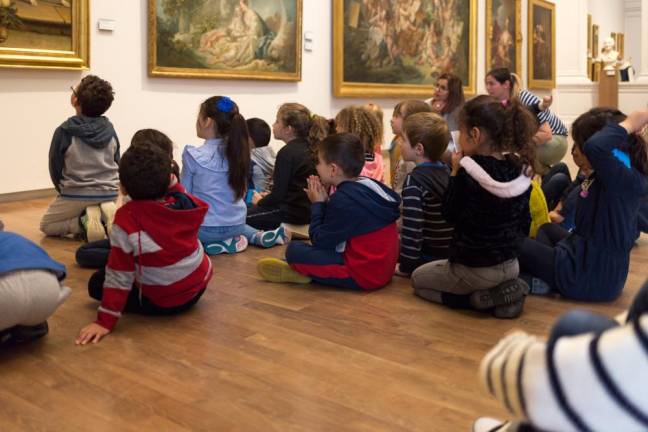Don’t worry, field trips aren’t going anywhere
Enrichment. Field trips were stopped, at least temporarily, by Covid, and then there’s the cost and logistical headaches to contend with. But teachers say nothing inspires students quite like taking them out of their same-old brick-and-mortar classroom.

Field trips are some of the most pivotal and exciting experiences of a child’s school years, forging happy memories and sparking lifelong passions. It may be the first time they’ve seen an llama or a Picasso. For many students, field trips to nature preserves, museums, planetariums, and other stimulating places inspire them to learn more.
But many school districts have cut field trips from their curriculums. Balancing the curriculum and negotiating the logistics of test scheduling can leave teachers feeling overwhelmed. And then there are the costs for buses and fuel. Field trips tend to be viewed as extra-curricular activities, or worse, “fluff,” which makes them easier to cut from school budgets.
And with the added pressure of a worldwide pandemic, the fading of field trips has sped up quite a bit.
“Obviously, the pandemic has impacted all aspects of teaching and learning, including field trips, and has impeded the district’s ability to provide these types of opportunities for students,” said Eric Hassler, Assistant Superintendent for Curriculum and Instruction at Monroe-Woodbury Central School District.
“Our first priority is always the health and safety of our school community, and this was true even prior to Covid,” he said. “We believe in the value of field trips, but first and foremost we must ensure the health and safety of our students and staff.”
Pandemic aside, Hassler believes field trips are a meaningful extension of class instruction and hopes to get back to the swing of them as soon as it’s safe to do so.
Learning that lasts
On the academic side, a recent New York University study by Emilyn Ruble Whitesell shows that field-based learning increases test scores. Middle school students who participated in science field trips scored better on the state science test and increased their likelihood of being proficient on the exam by 1.2 - 1.9 percentage points, the study found.
“Those hands-on learning activities, where you’re applying concepts that students are learning, is so important,” said Peg Schaffer, Assistant Superintendent at the Delaware Valley School District. “It’s so different than when they’re just reading and writing.”
Field trips and hands-on learning make concepts more memorable. Think back to the field trips you took with your classmates. Chances are, the things you learned on these trips stick with you today.
According to a study by Resource Area for Teaching, “Teachers who conduct hands-on learning activities on a weekly basis out-perform their peers by more than 70 percent of a grade level in math and 40 percent of a grade level in science.”
It makes sense: memories are forged by what we see and interact with, not just on what we hear.
“Application of the skills that they’re learning is really beneficial,” said Schaffer. “It’s that constructivism — you know, they’re constructing knowledge and not just a recipient of it. It creates better brain activity. You’re much more likely to hold onto that knowledge when you’re actually experiencing it.”
Alternative learning
Covid-19 has introduced and expanded virtual learning, which has created an entirely new learning landscape. This has decreased the possibility of field trips while increasing alternative learning experiences.
“Bringing outside experts into the classroom, although it’s not as beneficial as actually going on a trip, is definitely better than not having anything at all,” said Schaffer.
These sorts of experiences, with guest speakers and interesting visitors, can also be done virtually, and became a common practice even before the pandemic.
“We’ve been doing these sorts of activities for a decade, but we’ll probably be seeing more of them,” said Schaffer. “I certainly hope they don’t replace those external hands-on experiences. It’s just a matter of Covid curtailing those external experiences.”
A stimulating break from routine
Field trips that immerse students in a range of sensory activities outside of the classroom help them develop social skills. Navigating learning tools outside of the traditional bricks-and-mortar setting can help expand students’ overall well-being and socialization.
“My favorite field trips are those that provide experiences that students may not otherwise get,” said Hassler.
It’s important for kids to look outside of their normal routine and navigate real-world activities. Not only does it refine their social skills, an educational experience outside of the classroom may allow students to explore interests they might not have thought about before.
“How better to learn about ancient Egypt and the pharaoh Hatsheptsut than going to see one of her original sphinxes on display at the Metropolitan Museum of Art?” Hassler said.
He believes all students can benefit from experiential learning: from learning the process and science behind pizza-making while on a field trip to a pizzeria, or listening to a classical piece played live by a world class orchestra in a concert hall.
“And it’s always fun to spend time with classmates outside of school,” said Hassler.
And there’s that.